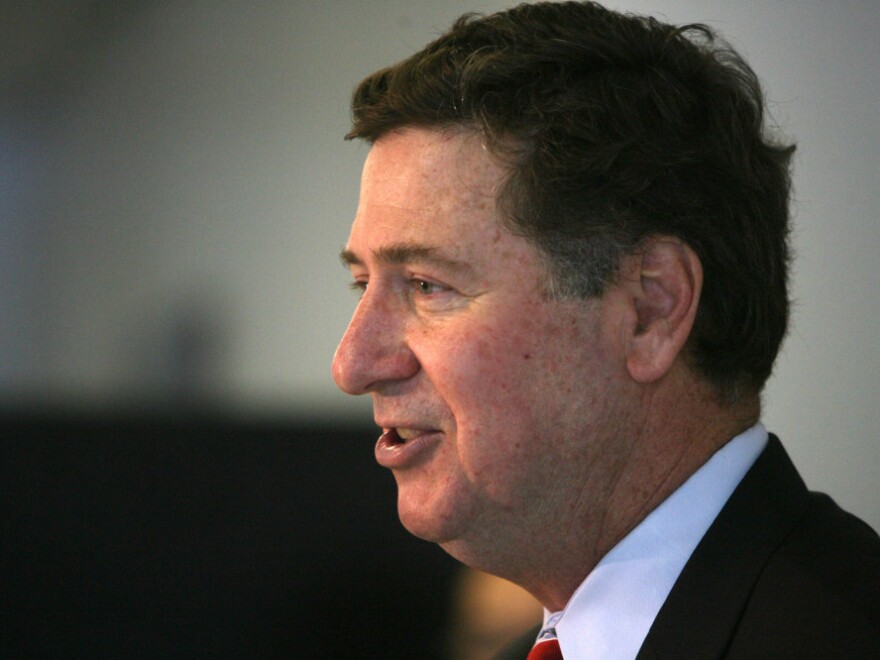A debate in Richmond, Va., on Wednesday kicks off what promises to be one of the most closely watched and expensive U.S. Senate races in 2012.
The seat in question is being vacated by Democrat Jim Webb, who has chosen not to run for a second term. Running to replace him are two former Virginia governors: Republican George Allen, who held the Senate seat before Webb defeated him in 2006, and Democrat Tim Kaine, who recently served as chairman of the Democratic National Committee.
It's a race likely to revolve around two key issues: President Obama and the economy.
Allen's Line Of Attack
During a recent speech to business executives at a forum in an upscale hotel next to an upscale Northern Virginia shopping mall, Allen posed a question: "How many of you all here are leading a better life than did your parents?"
He asked for a show of hands. "Well, that's everyone," he said of the response.
Allen then asked: "How many of you all believe, truly believe, that your children will have better opportunities in life than you had?"
Far fewer put up their hands. Allen says the response in the prosperous Washington suburbs is a bit more positive than in other, more economically hard-pressed areas of the state — and that concern about the future is a cornerstone of his campaign.
Allen is a familiar figure to Virginia voters. He served four years as governor, six as senator and appeared to be well on his way to a second Senate term before he was derailed by his now infamous "macaca" moment. Allen used the slur to describe an Indian-American man who was taping one of his campaign appearances.
That was more than five years ago. Now Allen is back on the campaign trail, serving notice that he intends to tie Kaine, his opponent next November, to the man who will be at the top of the Democratic ticket: Obama.

"He's been for this Obama stimulus that has not created the jobs they've promised," Allen says. "He's for tax increases now in the midst of this weak economy — as he did as governor. He's for this Obamacare, which is such an impediment to hiring. And so I have a different vision."
Defense Dollars
Allen's vision encompasses traditional Republican themes — low taxes and small government, except when it comes to defense spending. That's a key distinction in Virginia, home to the Pentagon, the CIA, several major military bases and a huge industry of national security contractors. All are highly reliant on continued federal spending on security, which by one estimate pumps some $57 billion a year into the state's economy.
Kaine, who was at the same forum, is also aware of the importance of defense dollars, which is why he says Congress should let the Bush-era tax cuts for upper-income taxpayers expire.
"Before we start to slash defense past the point of no return, we ought to be talking about doing exactly what Congress promised," he said. "And I think what they should do is they should let the Bush tax cuts expire at the top end, over $500,000 a year. The reason I say that is if we make cuts — and we're going to and I know how to do them, I did them as governor — we will affect middle- and lower-income people the most with the cuts."
Kaine is also familiar to Virginia voters: He served as mayor of Richmond and as governor for four years. Most recently, he was Obama's hand-picked chairman of the Democratic National Committee. Kaine was an early Obama supporter, and the president pushed him to enter the Senate race when Webb announced his retirement.
Virginia political analyst Mark Rozell of George Mason University says those ties will be difficult for Kaine to shake.
"That will be one of the challenges for Tim Kaine: his very close association with a president who right now has relatively low approval ratings, during a period of economic anxiety in the country," Rozell says. "Most Democrats who have run successfully in Virginia have run as moderate conservatives, and they have separated themselves very clearly from the national Democratic Party. Tim Kaine really can't do that."
The Obama Factor
Kaine concedes his ties to the president will work both ways in the fall.
"People will make up their own mind," he said. "I'm sure the fact that I worked closely with the president is something that some people like and some people don't, but I've been in office for 17 years in Virginia as a mayor and governor. I got a track record of my own, and I think people understand what that is."
The president is likely to be a frequent visitor to Virginia, where he hopes to replicate his 2008 win, and where his organization and turnout efforts may be an asset to Kaine.
Early polls show Kaine and Allen to be statistically tied. Both are expected to raise millions of dollars for the race, in one of a handful of tossup states that will determine whether Democrats hold on to the Senate.
Copyright 2021 NPR. To see more, visit https://www.npr.org.




